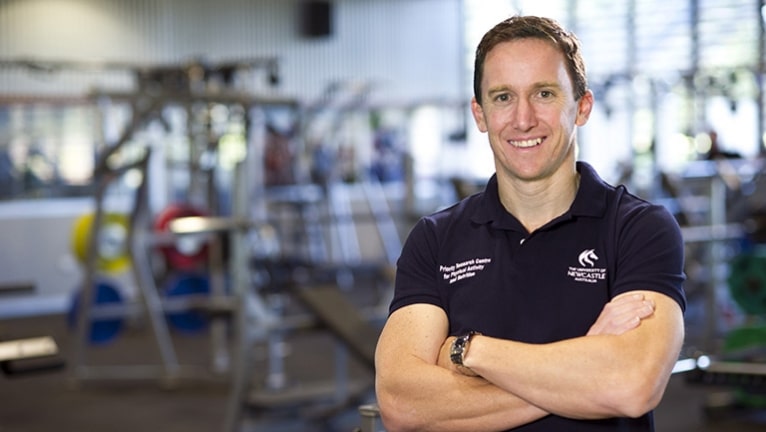
Study finds dads are often absent from studies that test best ways to treat obesity in children.
Fathers are often a missing link in research investigating the effectiveness of childhood obesity prevention programs, a University of Newcastle (UON) study has confirmed.

Lead investigator, Professor Phil Morgan from the UON’s Priority Research Centre for Physical Activity and Nutrition and the HMRI Cardiovascular Program, said finding ways to reduce escalating childhood obesity levels, physical inactivity and poor eating habits were international health priorities.
“Parents have a profound influence on their children’s weight status and lifestyle behaviours through their own behaviours, parenting practices and role in shaping the food and physical activity environment at home. However, the majority of obesity prevention programs to date have not included fathers, which could have a considerable influence on the effectiveness of the interventions.”
The world’s first systematic review to investigate the involvement of fathers in pediatric obesity treatment and prevention programs, just published in Pediatrics by the American Academy of Pediatrics, included 213 studies of lifestyle programs for children over a 10 year period. All programs included some form of parent involvement.
“The lack of fathers was particularly notable in programs that limited participation to one parent only, where fathers represented only 6 per cent of participating parents. Although fathers were under-represented across all study types and population groups, only 2 per cent of the studies suggested that the lack of father involvement was a possible limitation and only 1 per cent of studies reported explicit attempts to increase father involvement.”
Prof Morgan said fathers or other male role models such as uncles or grandfathers could play an invaluable role in these programs, but often have fewer opportunities to participate due to competing work commitments, reduced awareness of programs, and a lack of accessible and appealing programs designed specifically for dads.
In addition, he said many programs have failed to recognise the unique, independent and important role of fathers in their children’s lives.
“Fathers have a particularly important influence on key behaviours such as their children’s physical activity and dietary habits, which are linked to a child’s weight status. Quality and quantity time spent with dad is important.”
Although studies explicitly engaging dads are rare, innovative strategies to make participation more accessible and engaging for fathers have shown great promise. Prof Morgan and his research team are leading the charge to engage fathers in family-based nutrition and physical activity research. His research team is the only one worldwide that has developed father-focused lifestyle programs for children such as the multi award-winning Healthy Dads, Healthy Kids program and the Dads And Daughters Exercising and Empowered (DADEE) program.
“It is so much easier for parents to positively influence their child’s behaviour when they are both on the same page. Co-parenting, that is where parents support each other and parent in a consistent manner, leads to better child outcomes and this is far more achievable when both parents have been educated in evidence-based parenting strategies.”
Prof Morgan said that without deliberate and sustained efforts to recruit fathers, the default position would always be mother-centric programs.
“In today’s world, fathers are spending much greater time with their children, which demonstrates they do want to be involved. The average number of hours per week dads spend on child care has tripled in the past 50 years.”
He said a culture shift was needed where researchers recognise and value the contribution of fathers and design programs that appeal to fathers and minimise the barriers to father involvement.
“Encouraging fathers to participate in lifestyle programs with their children is extremely beneficial, for them and their children. Research shows fathers are generally more likely than mothers to initiate and facilitate physical activity with their kids at home, spend a greater proportion of their time playing with their children, and engage in a type of play that is more physical, stimulating, and unpredictable. The emotional bond between fathers and their children has been referred to as an “activation relationship” that develops primarily through physical play and enhances children’s physical and social-emotional outcomes.”
‘Involvement of Fathers in Pediatric Obesity Treatment and Prevention Trials: A Systematic Review’ published by the University of Newcastle’s Professor Philip Morgan, Dr Myles Young, Dr Adam Lloyd, Monica Wang, Dr Narelle Eather, Dr Andrew Miller, Elaine Murtagh, Dr Alyce Barnes and Sherry Pagoto. HMRI is a partnership between the University of Newcastle, Hunter New England Health and the community.
HMRI would like to acknowledge the Traditional Custodians of the land on which we work and live, the Awabakal and Worimi peoples, and pay our respects to Elders past and present. We recognise and respect their cultural heritage and beliefs and their continued connection to their land.

Hunter Medical Research Institute
We’re taking healthy further.
Locked Bag 1000
New Lambton
NSW, Australia, 2305



This site is protected by reCAPTCHA and the Google Privacy Policy and Terms of Service apply.
Copyright © 2024 Hunter Medical Research Institute | ABN: 27 081 436 919
Site by Marlin Communications
